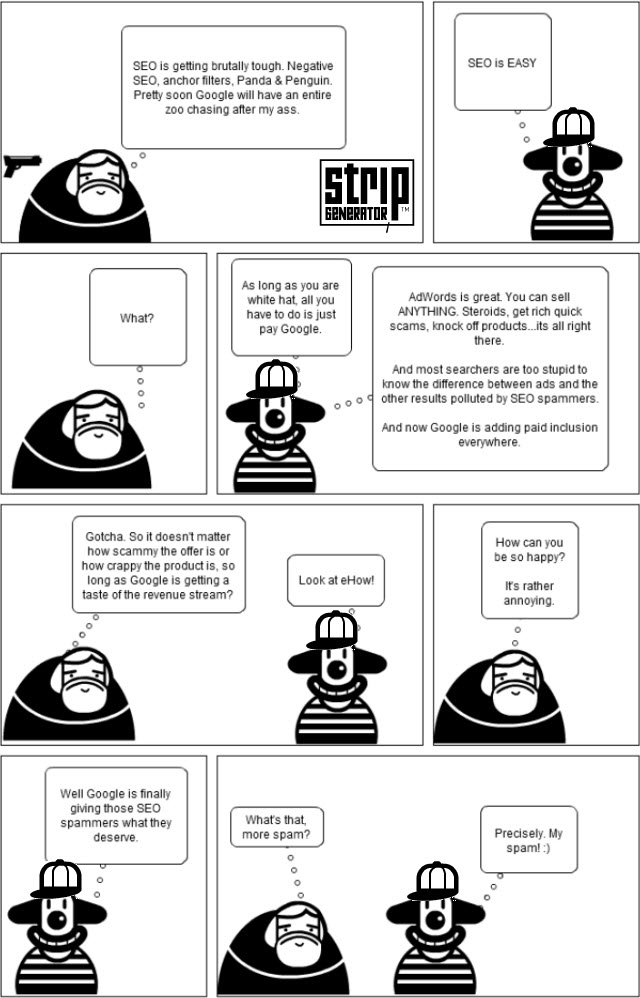Top 10 List of Top 10 Lists for your Top 10 List Compilation
A lot of amazing technology is being created.
The Only Constant is Change
When you think of all the implications of the above video (and all the things that are going on in machine learning & search), it can be somewhat difficult to think about sustainable strategies.
Want to fund in-depth automotive reviews in part based on your organic rankings? That business model breaks down when the organic SERPs move below the fold.
When platforms are new they start off as being fairly open to win attention & maximize their growth rates. Over time as they push to monetize they shift gears & what was once true becomes misleading. Thus a lot people likely come off as sounding like quack jobs because they keep having to reinvent themselves & reassess their belief systems as the markets change.

Hello Mr. Cynic
If you write things that sound like rants & complaints a lot of people mistake it as thinking you are a crank full of gloom & nonsense. For what it is worth, in many ways I think the future of the web will still be bright, but just relatively less bright than it was in the recent past for smaller players.
During the creation of any new communications network there are amazing opportunities, but over time they get arbitraged away & returns move more toward the typical norm in business as the platform gets locked down.
No Longer An Isolated Channel
The web is becoming more & more like the physical world (and is merging with it). For a long time search & online was largely a meritocracy, where the best person could easily win even if they came from the most humble beginnings.
In the offline world there are many hoops one has to jump through to win and the online market is just becoming more like that & at an accelerating rate due to network effects that allow big companies to saturate channels & tracking leading to asymmetrical advantages.
From Meritocracy to Corporatocracy
In search of years gone by, large & complex organizations that were overly bloated and inefficient routinely had their asses handed to them by smaller & more efficient operations. But then size became a primary signal of relevancy & quality, and that all changed. As Larry Page & Sergey Brin warned, the relevancy algorithms inevitably follow the underlying business model of the search engine.
That is a big part of the disillusionment with Google. For many years they were a leveler which was concerned primarily with quality. That grew the importance of search & differentiated them from everyone else, but then they decided to be "the same" & so many who promoted them felt a bit betrayed.

If a person gives you something and then takes it away you likely view them worse than someone who simply never offered that in the first place. As a species we are biologically aligned with being adverse toward loss.
Vertical AND Horizontal Integration
I was chatting with a friend about the above trend & his responses were:
- "you don't shoot the guy that didn't give you the job; you shoot the guy that gave you the job and then fired you"
- "their public image as being a leveler becomes more grating too, given how much they no longer represent that"
- "the biggest problem we have in search is that search engines don't view themselves as a medium. They want to be the cable operator + television show + in-show advertising + commercials...I'm not aware of another medium where it works that way"
The last of those 3 points is a big deal. Consider how popular music is & that Machinima drives about 2/3 as many video streams as all of VEVO does & yet Google invested directly into it. That gives Google power to rank the content (Google serps), host the content (YouTube), monetize the content (ads), and have an ownership stake in the content. All that is in addition to owning a browser, an operating system (make that two) & building hardware.
If Google's internal stats show someone else is catching up to a channel they invested in, Google can...
- relay this news across to drive editorial quality, content quantity, or even ad placement
- preferentially promote the network they are invested in (free ads, better rankings, more "you might also like" recommendations, more post-view recommendations)
- give a higher revenue share to the network they are invested in (or offer them early access to new betas and exclusives that increase monetization)
- slow the growth of the competing network by using more aggressive ad placement (or lower CPM ads)
- slow upload speeds for competing channels
- etc.
If you are batting for the home team, such advantages are great. But they blow for everyone else in the ecosystem.

Those sorts of issues don't just appear in a few isolated incidents, but appear over and over again.
Social networks should be open, unless they are Google+.
Affiliate links shouldn't count for ranking purposes, unless they are Viglink, which Google invested in. ;)
Affiliate links should be clearly labeled as such. When they are not clearly labeled & go through tracking redirects they are sneaky redirects in Google's remote rater guidelines. On YouTube the affiliate links to Amazon & iTunes are not labeled as such & add an extra layer of tracking redirects to the sequence.
Let Me See Your Backlinks!

Yesterday someone sent me an email about their reinclusion request being denied because someone else scraped their eZineArticles article & syndicated it to another 3rd party site.
They didn't create that link and yet they are somehow supposed to get a spammer (maybe one from another continent!) to remove it. In many cases spammers won't respond to anything other than cash, but if you do offer cash to get the job done then that spammer might keep adding more and more links over time, turning their mark into an easy source of subscription revenues.
What is Wrong With This Picture?
The above scenario is ridiculous.
If you look at *any* site closely enough there will be something wrong with it.

Just by the virtue of existing & ranking you will pick up dozens to hundreds of spammy links you don't even want, due to SERP scraper sites that are trying to rank on longtail keyword queries.
About 5 years ago I had a page get filtered out because it gained about 500 scraper links in a month. No matter what I did that page would not rank until it was rewrote with a fresh page title. When you could change things & have the algorithms re-evaluate them automatically there was at least a decent opportunity to get around such issues.
Now that there is a manual review process holding you responsible for the actions of third party webmasters the market is a bit more grim.
But at least a bunch of link removal services are cropping up to profit from Google's errant logic. ;)
Engineers Ad Networks Love Quality Websites Big Brands
 A bigger company can always shut a site down, split off into sections, & so on. Plus if you are a bigger company you are more likely to enjoy the benefit of the doubt.
A bigger company can always shut a site down, split off into sections, & so on. Plus if you are a bigger company you are more likely to enjoy the benefit of the doubt.
But if you are a low margin small business who has seen declining revenue AND have to jump through further hoops (rather than focusing on running your business) at some point it is easier to give up than to keep on fighting.
After this year's FUD there is zero camaraderie in the industry.
That's How Business Works
Eventually a lot of the displacement trends that are hitting the organic search market will hit the paid search market & Google will make many of the enterprise AdWords management tools obsolete via a combination of various free scripts & data obfuscation.
At that point in time some of the paid search folks will look like the guy to the right, but nobody will care, as those same people reminded us that this is just how business works. :D
Google appears to have a culture that condones shamelessly violating consumer privacy. How else can you explain a company that bypasses Apple's iPhone privacy settings in a reported attempt to strengthen advertising revenues?
It is hard to believe that Dave Packard or Andy Grove would ever tell a group of entrepreneurs that he did "every horrible thing in the book to just get revenues right away," or brag to trade publications that his company used behavioral psychologists to design "compulsion loops" into products to keep customers engaged. But Mark Pincus, the founder of Internet gaming giant Zynga, has done just that.
When corporate leaders pursue wealth in the winner-take-all Internet environment, companies dance on the edge of acceptable behavior. If they don't take it to the limit, a competitor will. That competitor will become the dominant supplier -- one monopoly will replace another. And when you engage in these activities you get a different set of Valley values: the values of customer exploitation.




Comments
Back in the Searchguild days I knew you had moxy, but now you've certainly got the gift of the gab! I'm gonna have to take a week off to read this month's worth of blog posts I think ;)
Hi,
Thank you. I like your thoughts. Not often we can find in USA a critical voice with so much Know How. In general, you guys there are so friendly with the latest trends and progress of capitalism.
I think the first signal that Google are losing by becoming so dominant at the market, in Germany Google takes 95% of the organic traffic, is that people are not joining like expected Google+, i heard a metaphor of a “Ghost Town”.
To resume, more people are getting aware of this money making machine, the change from search to a marketing machine. Here, in Europe, many do not trust the Big Players.
The ironic of these times, is that now, the biggest capitalists are not more located in USA, in China they control everything, not only the market, also the state and the people.
Take care,
...isn't really capitalism. Rather that is fascism. Ironically, many of the "free market democracies" are headed in the same direction.
Your images tell a lot about your content and they're easy to understand, especially for beginners. I would have to agree that the only thing constant is change so we need to keep formulating our strategies from time-to-time. What works today may no longer work tomorrow. Keep writing great articles!
In the past decade, I went from Google evangelist to Google detractor - and it is only because they don't give a shit about the reults being fair or altruistic in any way - they care only that they are profitable and controllable. As a business, I get it. As a customer of the world's leading search engine, I can't see it in any way, other than we are getting short-sheeted and date-raped by a monopoly. They used their position to create a level of acceptance and common-usage, and then turned it around to always end up in the black for their investors. They used their "unbiased" "non-evil" approach to search (a universal need) to create a regimented ad platform that is ubiquitously omnipresent - and that sucks. They got unilateral buy-in because they were not completely honest about where it was going. Maybe they were naive - but something tells me, no.
I have made a good living for over 10 years by being able to create better content than the competition and winning with it. I was never competing against myself or Google before though, nor was I worried about some competitor being able to take me out with a $2000 shit-storm...and now they took this all away from me, and I can't market knowing how to help you organically improve using content, if there is no organic improvement to be decently measured, and any that does make it above the fold is going to be the exception rather than a rule.
But they have slipped these changes in semi-gradually, so only SEOs truly see it, and Johnny Armchair is still clicking away at the top 3 spots, just like always...he just does not realize that these three spots are there, now filled by Google, purely to earn more for Google. It was not this way a few years ago, but Johnny is still clicking, and Google is still earning, so all is well....right?
love the old school artwork... nicely done!
... was worried I put a few too many in the post. :D
In part trying to rationalize my recent reversion to my cardboard collecting roots.
Add new comment